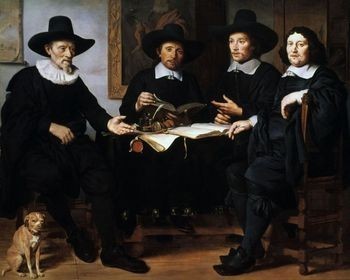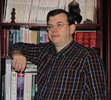What was England like in 1666?
What was England like in 1666
by
Richard Denning

This article was originally posted as a guest post on Above Average Below Special .
This post is part of a blog tour celebrating the release of my historical fantasy novel, The Last Seal. which is set during the Great Fire of London in 1666. The 17th century world may not be familiar to many readers so this post will give you a brief idea of the mindset of people on the eve of the fire. What did the people worry about and what were their fears in that summer of 1666?
The population of all of England was only about 4 million people at this time. Greater London had about 300,000 people. Most of the land was rural and people were used to living in small communities except those in the big cities. Nevertheless news did travel about and there are many elements that go into the mix to make up your average Englishman or woman in 1666.
England was a land where people still remembered the English Civil War of 1642 -51. This had ended only 14 years before and large numbers of the population had fought in the war. Indeed 100,000 people had died in the civil war which it may surprise you to know is a higher % of the population than losses in World War One or Two! That war had shown the deep divides in the land and many of those divides still existed.
At one level the war had been fought between those who believed in the rights and authority of parliament and those who believed in the sovereignty of the King. But it was not as simple as that. Many who fought on one side or the other did so for religious convictions with the Puritans siding with Parliament and those with sympathies for the established church or who were catholic more often favouring the king. Some followed their heart which told them that duty to the king was paramount. Others believed that in opposing the King's army they were acting to free him from poisonous elements that influenced him.
In the end King Charles I had fought against parliament and lost. He was beheaded in 1649 and the land ruled by a rump parliament answerable to the army and ultimately to Oliver Cromwell who eventually became a dictator. After Cromwell died the country slid into chaos and in the end it was the same army that recalled Charles II who returned in triumph in 1660.
In 1666 King Charles II had only been king 6 years. There were many who did not fully trust the king and a good number who opposed his restoration and believed in a republic. Some would go as far as armed rebellion or attempts at assassination. There were at least half a dozen plots against the King in those first 6 years. Charles responded by introducing a robust organisation of spies and informers. Because of these attempts to overthrow the king there was great fear of more Catholic "papist plots" like the Gunpowder plot of 1605 and the more recent attempts on the king's life.
Mistrust was not just confined to home spun plots and enemies. In 1666 England was at war with both Holland and France over domination of the seas and of world trade and everyone was paranoid about foreign spies. As a result all foreigners were viewed with suspicion and stories abounded about atrocities inflicted by these other nations.
This was also a time of superstitions and a period when people believed in omens and magic. The fire occurred during a time when people were tried and hanged for witchcraft – something like 1000 people had been executed as a witch in the century before 1666. It was also a year particularly associated with evil omens and signs. So there was a solar eclipses in the 1666. Comets had been seen in the skies the year before. There were lunar eclipses. All these events were harbingers of doom.
Doom seemed likely to many that year. Although even in our own time every few years people predict that the world will end, many people really believed that 1666 was the end of the world!! This was in part linked to the fact that in the Book of Revelations there is a passage that says that the number of the beast – of the devil is 666. Several famous astrologers has also predicted a great plague in 1665 and a fire in 1666. No doubt many others predicted other events that DID NOT happen so we should not read much into these predictions that did come to be true BUT of course such predictions added to the feelings of anxiety and paranoia that seemed to prevalent at this time.
Of course many people lived their lives concerned with the simple facts of existence. In a time of widespread poverty just getting through each day was a struggle. Nevertheless you can well imagine what, taken as a whole, this mix of fears and anxieties produced in the average man in the street. It did not take much to stir up the London mob and there was more than enough provocation due to the Great Fire.
Some of these elements – fear of conspirators, state sponsored spy organisations, religious and political tensions and the natural fear of foreigners and even those who are concerned with just getting through each day I have tried to reproduce in The Last Seal.
To read the first part of The Last Seal visit my website here:http://www.richarddenning.co.uk/thelastseal.html
Check out the books Facebook Page:
http://www.facebook.com/TheLastSeal
I am on Twitter:
http://twitter.com/#!/RichardDenning

by
Richard Denning

This article was originally posted as a guest post on Above Average Below Special .
This post is part of a blog tour celebrating the release of my historical fantasy novel, The Last Seal. which is set during the Great Fire of London in 1666. The 17th century world may not be familiar to many readers so this post will give you a brief idea of the mindset of people on the eve of the fire. What did the people worry about and what were their fears in that summer of 1666?
The population of all of England was only about 4 million people at this time. Greater London had about 300,000 people. Most of the land was rural and people were used to living in small communities except those in the big cities. Nevertheless news did travel about and there are many elements that go into the mix to make up your average Englishman or woman in 1666.
England was a land where people still remembered the English Civil War of 1642 -51. This had ended only 14 years before and large numbers of the population had fought in the war. Indeed 100,000 people had died in the civil war which it may surprise you to know is a higher % of the population than losses in World War One or Two! That war had shown the deep divides in the land and many of those divides still existed.
At one level the war had been fought between those who believed in the rights and authority of parliament and those who believed in the sovereignty of the King. But it was not as simple as that. Many who fought on one side or the other did so for religious convictions with the Puritans siding with Parliament and those with sympathies for the established church or who were catholic more often favouring the king. Some followed their heart which told them that duty to the king was paramount. Others believed that in opposing the King's army they were acting to free him from poisonous elements that influenced him.
In the end King Charles I had fought against parliament and lost. He was beheaded in 1649 and the land ruled by a rump parliament answerable to the army and ultimately to Oliver Cromwell who eventually became a dictator. After Cromwell died the country slid into chaos and in the end it was the same army that recalled Charles II who returned in triumph in 1660.
In 1666 King Charles II had only been king 6 years. There were many who did not fully trust the king and a good number who opposed his restoration and believed in a republic. Some would go as far as armed rebellion or attempts at assassination. There were at least half a dozen plots against the King in those first 6 years. Charles responded by introducing a robust organisation of spies and informers. Because of these attempts to overthrow the king there was great fear of more Catholic "papist plots" like the Gunpowder plot of 1605 and the more recent attempts on the king's life.
Mistrust was not just confined to home spun plots and enemies. In 1666 England was at war with both Holland and France over domination of the seas and of world trade and everyone was paranoid about foreign spies. As a result all foreigners were viewed with suspicion and stories abounded about atrocities inflicted by these other nations.
This was also a time of superstitions and a period when people believed in omens and magic. The fire occurred during a time when people were tried and hanged for witchcraft – something like 1000 people had been executed as a witch in the century before 1666. It was also a year particularly associated with evil omens and signs. So there was a solar eclipses in the 1666. Comets had been seen in the skies the year before. There were lunar eclipses. All these events were harbingers of doom.
Doom seemed likely to many that year. Although even in our own time every few years people predict that the world will end, many people really believed that 1666 was the end of the world!! This was in part linked to the fact that in the Book of Revelations there is a passage that says that the number of the beast – of the devil is 666. Several famous astrologers has also predicted a great plague in 1665 and a fire in 1666. No doubt many others predicted other events that DID NOT happen so we should not read much into these predictions that did come to be true BUT of course such predictions added to the feelings of anxiety and paranoia that seemed to prevalent at this time.
Of course many people lived their lives concerned with the simple facts of existence. In a time of widespread poverty just getting through each day was a struggle. Nevertheless you can well imagine what, taken as a whole, this mix of fears and anxieties produced in the average man in the street. It did not take much to stir up the London mob and there was more than enough provocation due to the Great Fire.
Some of these elements – fear of conspirators, state sponsored spy organisations, religious and political tensions and the natural fear of foreigners and even those who are concerned with just getting through each day I have tried to reproduce in The Last Seal.
To read the first part of The Last Seal visit my website here:http://www.richarddenning.co.uk/thelastseal.html
Check out the books Facebook Page:
http://www.facebook.com/TheLastSeal
I am on Twitter:
http://twitter.com/#!/RichardDenning

Published on August 31, 2011 15:16
No comments have been added yet.



